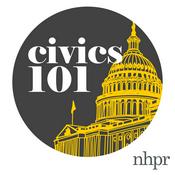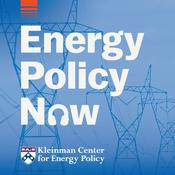Episódios Disponíveis
5 de 36
- Long-Haul Charging: Powering Heavy-Duty Trucks with ElectricityElectric medium- and heavy-duty vehicles are on the rise around the world as more businesses electrify their fleets and delivery vehicles — global electric truck sales grew by almost 80% in 2024. But what does it take to build multi-megawatt charging stations to support electric fleets? Jason Berry, Vice President of Terawatt Infrastructure, joins host Sara Baldwin to discuss the challenges and innovative approaches to building the infrastructure we need to power big trucks for the long-haul.Guest Bios: Jason Berry is the Vice President of Energy & Utilities at Terawatt Infrastructure, where he leads utility engagement, energy infrastructure development, regulation, and policy for a national portfolio of private charging depots serving commercial fleet customers. Jason is an experienced leader in the energy sector with over 20 years of experience advancing emerging energy technologies, developing infrastructure, and shaping policy and regulation. He previously held senior leadership roles in energy at Amazon and Amazon Web Services, as well as in the public and utility sectors, where he managed multimillion-dollar clean energy projects and influenced various regulatory and policy initiatives. Jason holds a Master of Public Administration and a B.S. in Environmental Studies from the University of Utah.Electrifying News: Global renewable energy generation surpasses coal for first time (The Guardian, October 6, 2025)New Data Rebuts Long-Haul Misconception: Truck Electrification is Feasible on I-10 Today (Business Insider, October 15, 2025)This startup’s electric roasters cut carbon and costs from coffee-making (Canary Media, October 16, 2025)Check-out these must-read resources:Terawatt Opens Its First Medium- and Heavy-Duty EV Charging Site in California I-10 Truck Charging Project to Cross 4 States Starting in 2027 (Heavy Duty Trucking)National Zero-Emission Medium- and Heavy-Duty Infrastructure Map (CalStart)Trends in heavy-duty electric vehicles (International Energy Agency, Global EV Outlook 2025)Powering America's Commercial TransportationRun on Less (North American Council for Freight Efficiency)Charged Initiative--------43:02
- Congress Repealed Federal Clean Energy Incentives! How to Act Before It’s Too LateThe One Big Beautiful Bill is a big bad deal for U.S. households, businesses, and the climate. The law repealed numerous clean energy, efficiency, climate, and electrification incentives and funding, among other major changes. Energy Innovation’s modeling shows that the law will result in the U.S. foregoing 340 gigawatts of new electricity capacity by 2035, and an increase in wholesale electricity prices by 74 percent by 2035. America will also lose $980 billion in cumulative GDP and around 760,000 jobs by 2030. Two experts from Advanced Energy United discuss the law, its impacts on clean energy companies and consumers, and what people and businesses can do to take advantage of expiring tax credits before they’re gone. Guest Bios: Harry Godfrey, Managing Director, leads Advanced Energy United’s Federal Priorities team, which serves as the focal point for our engagement with lawmakers on Capitol Hill and policymakers in the Administration. With experience in industry, federal government, and academia, Harry played a pivotal role in the passage of the Virginia Clean Economy Act. Before arriving at Advanced Energy United, Harry worked at Invenergy and Opower, where he developed expertise in renewable generation and energy efficiency. He previously held positions in the White House Office of Legislative Affairs and the Office of Majority Whip James E. Clyburn.Sarah Steinberg, Director, leads Advanced Energy United's building decarbonization and the natural gas transition work, developing advocacy strategies and educating key decision-makers across state houses, administrations, and agencies to accelerate the transition to 100% clean energy in the built environment. Previously, Sarah led portfolios of work in Nevada and Indiana, which focused on utility resource planning, transportation electrification, distributed energy resources, and wholesale markets. Before joining Advanced Energy United, Sarah worked as legislative staff to a State Representative in the Massachusetts State House. Electrifying News: Court upholds a landmark clean-heat rule in Southern California (Canary Media, 7/23/25)Booming solar and storage are propping up Puerto Rico’s grid this summer (Utility Dive, 7/22/25)Massachusetts test shows big savings from free heat pumps and solar (Canary Media, 7/17/25)Check-out these must-read resources:Advanced Energy UnitedUnlocking Advanced EnergyEnergy Innovation’s Economic Impacts of the One Big Beautiful Bill ActElectrification Coalition's Ev and Charging Tax Credits After the One Big Beautiful Bill ActMake sure you use these tax credits before they’re gone (Rewiring America)Use Tax Credits for EVs and Your Home Before They're Gone (Canary Media)--------48:50
- The One Big Beautiful Bill Act and other federal repeals will crash America’s EV marketFederal lawmakers and the Trump Administration are trying to put the breaks on clean electric vehicles that save people money and clear the air we breathe. What does it all mean for consumers and the burgeoning U.S. EV market? Host Sara Baldwin speaks with Mary Nichols, former chair of the California Air Resources Board and renowned leader on clean air and transportation to discuss the impacts of recent federal actions—from the One Big Beautiful Bill Act’s repeal of critical EV incentives to the Senate’s recent blockade of California’s clean vehicle policies, and federal agencies’ plans to roll back smart vehicle emission and fuel economy standards. Tune in to learn more about what’s happening and what’s needed to sustain momentum for EVs and clean transportation despite roadblocks.Guest Bio:Mary Nichols is the former chair of the California Air Resources Board, where she occupied the attorney seat; she served on the Board under Governor Edmund G. Brown, Jr. (1975–82 and 2010–18), Governor Arnold Schwarzenegger (2007–2010), and Governor Gavin Newsom (2019–2020). She also served as California’s Secretary for Natural Resources (1999–2003), appointed by Governor Gray Davis. Mary was also a senior staff attorney for the Natural Resources Defense Council; Assistant Administrator for U.S. EPA’s Office of Air and Radiation, in the administration of President William Jefferson Clinton; and headed the Institute of Environment and Sustainability at UCLA. Over a career as an environmental lawyer spanning over 45 years, Mary Nichols has played a key role in California and the nation’s progress toward healthy air. She has also led the Board in crafting California’s internationally recognized climate action plan. Nichols was awarded the Attorney of the Year award from California Lawyer Magazine (the CLAY award) for her contributions to environmental law. Nichols holds a B.A. from Cornell University and a J.D. from Yale Law School.Electrifying News:Affordable Clean Cars Coalition launches in the USA (Elctrive)Bill Ford says Michigan battery plant ‘in peril’ under proposed legislation (Automotive News)Why John Curtis says the Senate should reconsider rolling back green energy tax credits (KSL.com)To dig in deeper, check out these must-read resources: Assessing Impacts Of “One Big Beautiful Bill Act” On U.S. Energy Costs, Jobs, Health, Emissions(Energy Innovation, June 2025)Trump’s War on EVs Is an Attack on American Industry, Good-Paying Jobs, and Our Wallets(Evergreen Action, 3/5/25)Upending norms, the Senate votes to undo California's EV rules (NPR, 5/22/25)Transportation chief seeks to weaken fuel economy standards (AP News, 6/6/25)Trump EPA takes aim at Biden emissions regulations (Green Car Reports, 3/13/25)--------40:18
- Repealing Inflation Reduction Act Harms America’s Economy and Costs ConsumersThe Inflation Reduction Act of 2022 marked the single largest investment in climate and energy in American history, supporting homegrown clean energy, electrification, and manufacturing. It has generated $600 billion in private investment across 750 clean energy projects, creating more than 406,000 new jobs. The IRA is now under threat, with calls to repeal federal funding and tax credits, risking billions investments. Host Sara Baldwin speaks with Robbie Orvis of Energy Innovation to discuss the benefits of the IRA and how repealing the IRA would harm America's economy and cost consumers. Guest Bio: Robbie Orvis is the Senior Director of Modeling and Analysis at Energy Innovation where he works with policymakers around the world to analyze legislation and regulation and provide insights on how to achieve climate goals. He has helped develop and deploy Energy Policy Simulator models in more than a dozen countries and is the lead author of Designing Climate Solutions: A Policy Guide for Low-Carbon Energy. Robbie holds a Master of Environmental Management from Yale University and a B.S. from the University of California, Berkeley.Electrifying News:More Wisconsin cities are powering municipal operations with renewable electricity (Wisconsin Public Radio)Rivian startup is focused on small, lightweight electric vehicles (LA Times)Hyundai to make ‘low-carbon’ steel at $6B plant in Louisiana (Canary Media)Must-read Resources:Inflation Reduction Act bill text (U.S. 117th Congress)Energy Policy Simulator Model (Energy Innovation)Inflation Reduction Act Repeal Harms State Economies and Raises Consumer Costs (Energy Innovation, March 2025)House Republican support grows for keeping clean energy tax breaks (Politico, 3/10/2025)--------51:29
- Electrification Loves Grid ReliabilityIn this special valentine to the electric grid, Electrify This! host Sara Baldwin speaks with grid expert, Ric O’Connell of GridLab, about a topic front of mind for more people, utilities, and policymakers around the world: grid reliability. Demand for electricity is on the rise after decades of relatively flat load growth as more end-uses seek to connect to the grid. Simultaneously, the grid’s portfolio is diversifying as more utilities and states integrate more renewable energy, energy storage, and other clean energy technologies in the race to reduce climate emissions and stabilize the climate. While this transition has been underway for some time, converging factors are impacting the grid and uncertainty looms on the horizon. In this episode, we explore the myriad issues facing the grid and what policies and practices are needed to build a resilient, reliable, affordable clean grid to power the future. About the guest: Ric O’Connell is the founding executive director of GridLab, where he leads a team of experts to provide comprehensive technical grid expertise to policy makers and advocates. A recognized leader in renewable energy technology and policy, Ric has provided engineering support for more than 8 GW of utility scale solar projects worldwide. Ric also served as a consultant with Black & Veatch for 12 years where helped build a global renewable energy consulting practice and led numerous high-impact policy studies. Ric has a BSEE from Duke University and a Master’s in Renewable Energy Policy from CU Boulder.Electrifying News:2025 Renewable Energy Outlook: Full speed ahead as second Trump administration begins(Utility Dive, January 21, 2025)Uncertainty over Trump’s electric vehicle policies clouds 2025 forecast for carmakers (AP News, January 9, 2025)U.S. solar cell production resumes for first time since 2019, as solar module manufacturing sets record in Q3 (Wood McKenzie and Solar Energy Industries Association, December 2024) To dig in deeper, check out these must-read resources: Grid Lab – website: https://gridlab.orgEnergy Systems Integration Group (ESIG) website https://www.esig.energy/Surplus Interconnection Policy Explainer (Grid Lab)The Future of Operational Grid Reliability Can Be Bright with Clean Energy (Energy Innovation, Real Talk on Reliability Series) Explained: Fundamentals of Power Grid Reliability and Clean Electricity (National Renewable Energy Laboratory)Meeting Growing Electricity Demand Without Gas (Energy Innovation)What’s the impact of artificial intelligence on energy demand? (Hannah Ritchie, Sustainability by Numbers, November 2024) AI and energy: The big picture (Ben Levitt, S&P Global, December 2024)--------35:54
Mais podcasts de Ciência política
Podcasts em tendência em Ciência política
Sobre Electrify This!
Electrify This! explores the movement to electrify everything as a strategy to decarbonize and revitalize all sectors of our economy. Featuring diverse experts, the show examines the most important policy, regulatory, and market issues surrounding electrification of transportation, buildings, and industry. Electrify This! helps demystify issues surrounding the transition to 100 percent clean electricity, and focuses on the challenges, scalable solutions, and what decision-makers can do to ensure the movement to electrify is equitable for all. Electrify This! is an original Energy Innovation Policy & Technology LLC® podcast hosted by Electrification Director Sara Baldwin (former host of Grid Geeks podcast). Our podcasts are accessible under the CC BY license. Users are free to copy, distribute, transform, and build upon the material as long as they credit Energy Innovation® for the original creation and indicate if changes were made.
Site de podcastOuça Electrify This!, The Lawfare Podcast e muitos outros podcasts de todo o mundo com o aplicativo o radio.net

Obtenha o aplicativo gratuito radio.net
- Guardar rádios e podcasts favoritos
- Transmissão via Wi-Fi ou Bluetooth
- Carplay & Android Audo compatìvel
- E ainda mais funções
Obtenha o aplicativo gratuito radio.net
- Guardar rádios e podcasts favoritos
- Transmissão via Wi-Fi ou Bluetooth
- Carplay & Android Audo compatìvel
- E ainda mais funções


Electrify This!
Leia o código,
baixe o aplicativo,
ouça.
baixe o aplicativo,
ouça.






















